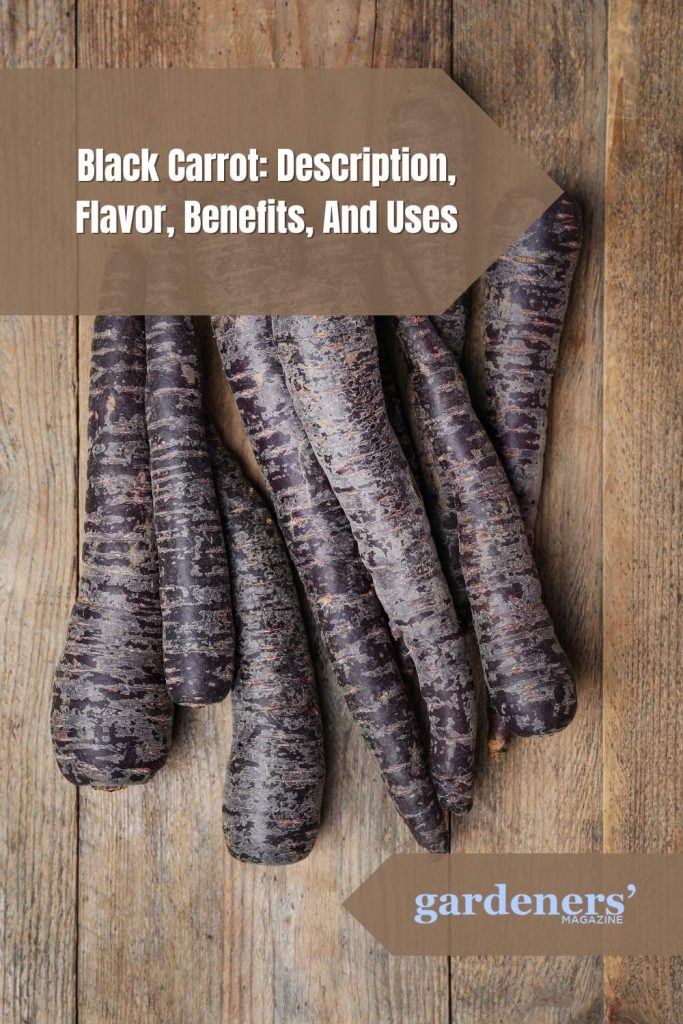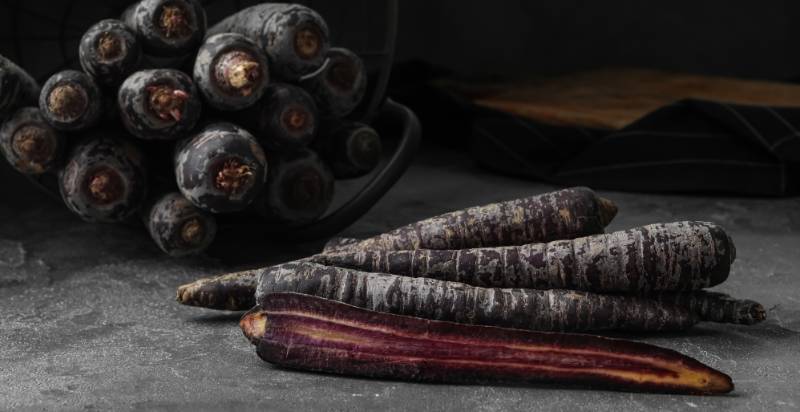Black Carrot, also known as “black pearl,” is an uncommon root vegetable with a deep black-purple hue. It belongs to the family of Apiaceae, which includes parsley, celery, dill, and coriander. This unique vegetable has been used in various cuisines due to its sweet and earthy flavor and medicinal properties. Black carrots are a powerhouse of various vitamins, minerals, and antioxidants, providing several health benefits. Here is everything you need to know about black carrots.
What is Black Carrot?
Black carrots are an uncommon root vegetable that grows in the Mediterranean regions of Europe, Africa, and Asia. They belong to the family of Apiaceae, which includes other vegetables such as parsley, celery, dill, and coriander. Black carrot has a black-purple hue and is sweet and earthy in flavor. This unique vegetable is crunchy and can be eaten cooked or raw.

History and Origins of the Black Carrot:
The black carrot has a long and interesting history. It originated in the Middle East, possibly in ancient Persia, where it was used for medicinal purposes. The black variety of the carrot is believed to have spread throughout Europe during the Crusades and eventually made its way to North America.
In North America, the black carrot has been used in various ways. It was used as an ingredient in medicinal remedies to treat various ailments. Additionally, consuming the black carrot was believed to help improve vision and aid digestion. Historically, the black carrot has been cultivated for its unique taste and color. The dark hue is especially attractive for natural dyes and is often used to make jams, juices, and pickles. The unique flavor of the black carrot has made it a popular ingredient in many dishes today.
Appearance of the Black Carrot:
The black carrot is characterized by its dark purple to almost black appearance. The stalks, leaves, and roots are usually all a deep purple color, and the fruit’s inside is yellow or orange. The root can be long and slender, with a rough outer surface.
What does Black Carrot Taste like?
The black carrot has a sweet taste that is slightly tart and tangy, which makes it an ideal choice for adding flavor to recipes like sauces and salads. Its earthy flavor makes it a great addition to roasted vegetables or stews.
Cultivation & Growing Conditions of Black Carrot:
Black carrots are easy to grow and don’t require overly-specialized conditions. They prefer a full-sun location with good soil drainage and can tolerate temperatures as low as 30 degrees Fahrenheit. If planting in early spring, it’s best to wait until the danger of frost is past before sowing the seeds.
The plants should be spaced about 10 inches apart and can be harvested once the carrots reach their desired size. They can also be left in the ground for an extended period to achieve a larger harvest. Black carrots should always be harvested before any heavy frosts, as this will damage them and reduce their flavor.
Plant Characteristics of the Black Carrot:
- Height: Up to 2 feet
- Spread: Up to 12 inches
- Flower Color: White or yellow
- Bloom Time: Late spring and early summer
- Light Requirements: Full sun
- Soil Requirements: Well-draining soil
- Hardiness Zones: 4–10
Health Benefits of the Black Carrot:
Black carrots are a great source of nutrients, especially compared to other carrots. They boast high levels of vitamins A and C and antioxidants and minerals, including calcium, magnesium, phosphorus, and potassium. The darker hue also indicates higher concentrations of polyphenols which may help reduce the risk of cancer. Black carrots have a mild, sweet flavor and are great in salads, juices, or cooked as a side dish. They can also be used to make dyes for foods and cosmetics.
Where are Black Carrots Grown and Harvested?
Black carrots are grown mainly in India, Turkey, and the Middle East. They can be found in some specialty grocers but are often hard to come by. If you’re lucky enough to find them, they should be harvested when they have glossy, dark purple skin–this indicates that they’re ripe and ready for eating. The flavor of these carrots is milder and sweeter than traditional orange varieties, so that you can enjoy them raw or cooked in various recipes.

Where can the Best Quality Black Carrots be found?
The best quality Black carrots are usually found by specialty growers at farmers’ markets or online. These carrots tend to be expensive because they are not widely available, so buying them from a trusted source is important.
To ensure you get the freshest and most flavorful carrots, look for those labeled organic or GMO-free. The carrots should be firm and have a deep purple color, indicating they’re fresh and of high quality. Avoid buying wrinkled, soft, or discolored carrots, as these are signs of old age or poor storage conditions.
What is the Best Way to Store Black Carrots?
The best way to store black carrots is to keep them in an air-tight container or bag in the refrigerator. This will help preserve their optimal quality and flavor for up to two weeks. Remove any excess moisture from the storage container, which can lead to mold growth. Additionally, it’s important not to wash the carrots before storing them, as this can draw moisture into the carrot, leading to spoilage. When ready to use, rinse off any dirt and debris with cool water.
How to Use Black Carrots in Recipes?
Black carrots can be used in a variety of dishes. They have a mild flavor and are often used to provide an earthy touch to salads, stews, soups, and other cooked dishes. They pair well with sweet fruits like apples and pears, adding a unique texture and flavor to the dish. Additionally, black carrots make for great additions to stir-fries and roasted vegetables when combined with other vegetables like onions, peppers, mushrooms, squash, zucchini, potatoes or sweet potatoes. For an extra pop of color in your dish—and some added nutrition—try adding some chopped black carrots along with traditional orange or red carrots.
Finally you can also use black carrots as a visual component on top of savory pies such as quiches and pot pies. The deep purple color pops against a golden brown crust, making for an appealing presentation. No matter how you decide to use black carrots in your recipes, you’re sure to enjoy the added flavor and nutrition they provide.
Conclusion:
Black carrots are incredibly versatile and can be used to create a variety of delicious dishes. From soups to salads, roasting to steaming, black carrots are a great way to add flavor and nutrition to any meal. Whether you’re looking for a nutritious side dish or the perfect sweet treat, adding black carrots will make your meal stand out. Enjoy these beautiful and delicious black carrots.
Unlock the secrets of toothache plant’s health advantages and growing tips by delving into our insightful article today!
- Everything You Wanted to Know About Red Tamarillos - June 2, 2025
- A Guide to Tulips: Everything You Need to Know & More… - June 2, 2025
- Guanabana: Description, Flavor, Benefits, And Uses - May 27, 2025

4 thoughts on “Black Carrot: Description, Flavor, Benefits, And Uses”
Comments are closed.